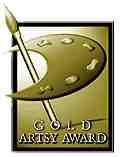Cyanosite Awards and DistinctionsPresented Chronologically From Most RecentCyanosite was selected on October 11, 2006 for the Encyclopedia Britannica Internet Guide:  Cyanosite was chosen on June 8, 2003 for the "Spotlight" section of Microbes.Info:  Cyanosite was recognized on May 7, 2002 with the Dr. Matrix Award for Science Excellence from "Dr. Matrix' Web World of Science":  Cyanosite was chosen for a Gold Artsy Award on June 23, 2001:  Cyanosite has been rated "child-safe" by ICRA on March 13, 2001 after several years with RSCA:  Cyanosite chosen for inclusion in ISI Current Web Contents on January 10, 2001:  Cyanosite was given the Argus Clearinghouse Seal of Approval on October 2, 1998:  Cyanosite was selected for inclusion in the Nearctica website of scientific resources on September 29, 1998 and can display this symbol:  A review of Cyanosite appeared in Genetic Engineering News on September 15, 1998 in Volume 18(16), page 35. The full text of the review can be seen here.  Cyanosite was reviewed on April 24, 1998 in the NetWatch section of the journal Science Volume 280, Number 5363. It seems quite an honor to appear in Science and a fine tribute to Cyanosite. The full text of the review can be seen here.  Cyanosite was included in the BioMedLink database on July 14, 1998 and can display this award:  Cyanosite has been honored by its selection for the Internet Scout Project appearing in Vol. 4 No. 41 on February 13, 1998 and proudly displays this award:  Cyanosite was chosen Web Pick of the Day on February 26, 1998 by HMS Beagle and proudly displays this award:  Cyanosite has been honored by its selection on August 10, 1997 for inclusion in the Science Central directory. Only the premier scientific websites in a given field are included and can legitimately display this award:  |
Supported by Biological Sciences at Purdue University and by Wichita State University